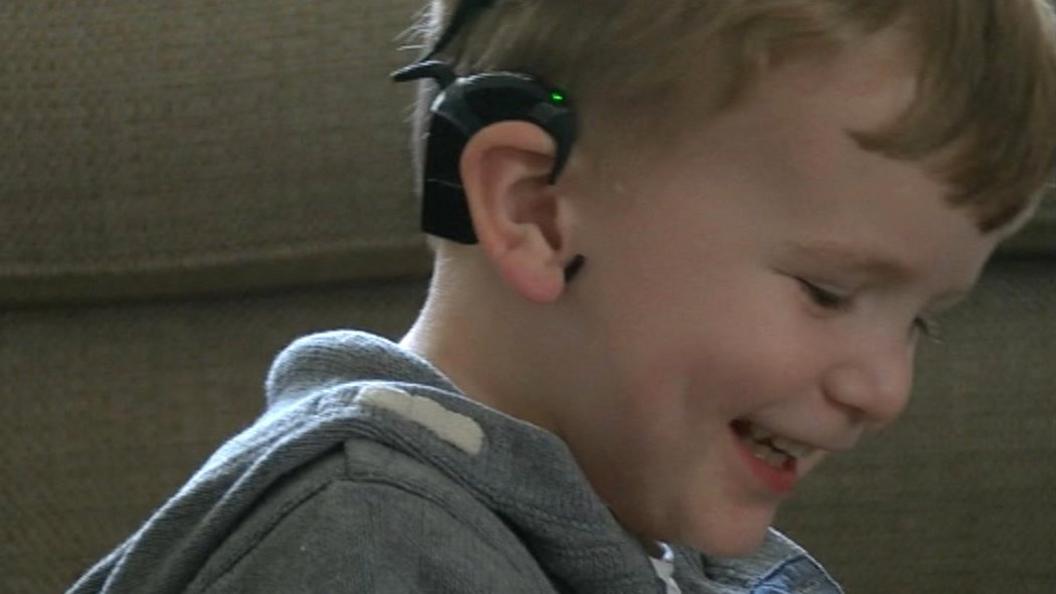Should pupils have to learn sign language?
- Published
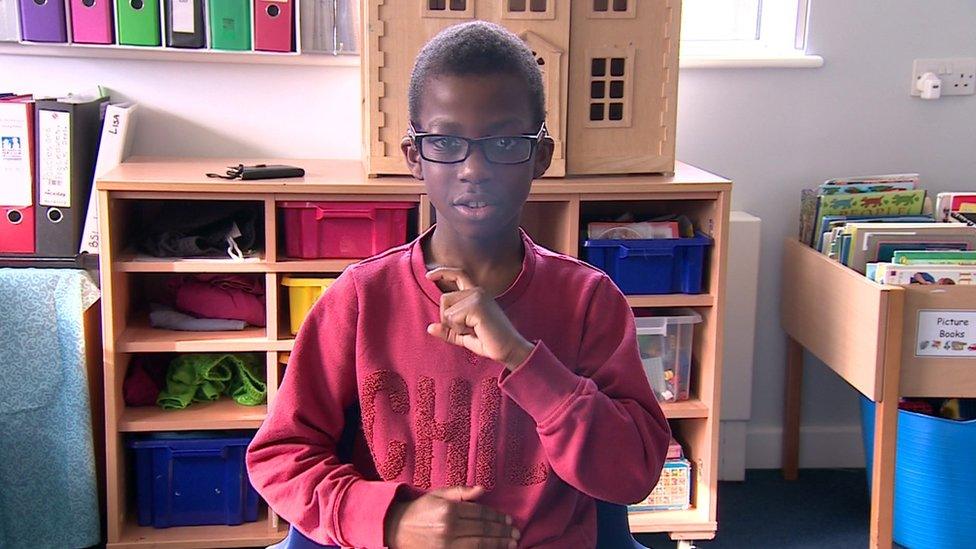
Emmanuel would like to teach everyone how to sign
"When I meet hearing children who can sign, I feel happy and confident," says Emmanuel, seven.
"I want to teach everyone British sign language - the whole world."
Faiza, 11, says: "If children learnt more sign, it would mean I'd try to play with them more. Communication would be easier.
"If my hearing friends didn't sign, I would feel lonely and sad."
For these deaf children at Blanche Nevile School in north London, helping hearing peers learn British sign language (BSL) is a chance to break down barriers and make new friends.
Their school shares a site with Highgate Primary School, and the schools work in partnership so that deaf and hearing children can learn alongside each other.
While BSL was recognised as a language in its own right 14 years ago, it is not included in the national curriculum in England.
Now, an online petition, external set up by Wayne Barrow, who grew up with deaf parents, is aiming to change that.
Pupils - both hearing and deaf - tell us their views
"I feel so passionate about this - growing up with deaf parents, I have seen the struggles and barriers of communication between them and other people," Mr Barrow says.
"If we can teach kids some of the basic signs, such as directions, money et cetera, it would make a big impact on a deaf person's life."
His views are backed up by children at Highgate Primary, who see the benefits of learning BSL.
Ivy, nine, says: "It can help deaf children. Seeing everybody sign would make them happy, and it would be easier for them to communicate.
"Sometimes, when it's really noisy at home, my sister and me start signing."
Amelie, 11, says: "When you're older, if you were to go deaf or if you had a child that was deaf, it would be easier to remember your signs because you would have learnt it at a young age."
Emma Illife, senior BSL teacher at Blanche Nevile, says using sign can help hearing people express themselves more freely.
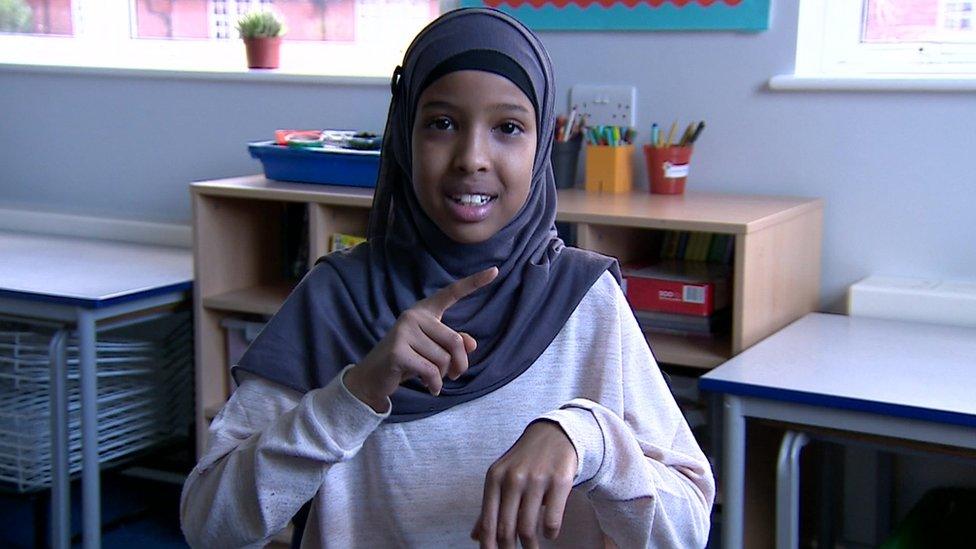
Faiza says signing helps communication with hearing friends
"They [hearing children] don't know about facial expressions, they don't know about pointing, it's kind of rude to be overly expressive - but it's the deaf way," she says.
"I encourage the hearing children to be confident with developing their use of facial expression, body language and movement, it really helps with the clarity of their communication."

Facts and figures
There are about 11 million people in the UK who are deaf or hard of hearing
There are more than 48,000 deaf children in the UK - 41,261 in England, 2,374 in Wales, 2,942 in Scotland and 1,497 in Northern Ireland
BSL is the first or preferred language of about 70,000 deaf people in the UK
BSL is not a translation of English - it has its own linguistics and a very different grammatical structures to English
The government acknowledged it as an official language in 2003.

The Department for Education in England has responded to Mr Barrow's petition, saying: "BSL was recognised as a language in its own right in 2003.
"Whilst it is not a mandatory part of the curriculum, schools are free to teach it if they choose to do so."
Of course the reality is that schools are busy places, and teachers already have their work cut out with a demanding new curriculum to get to grips with.
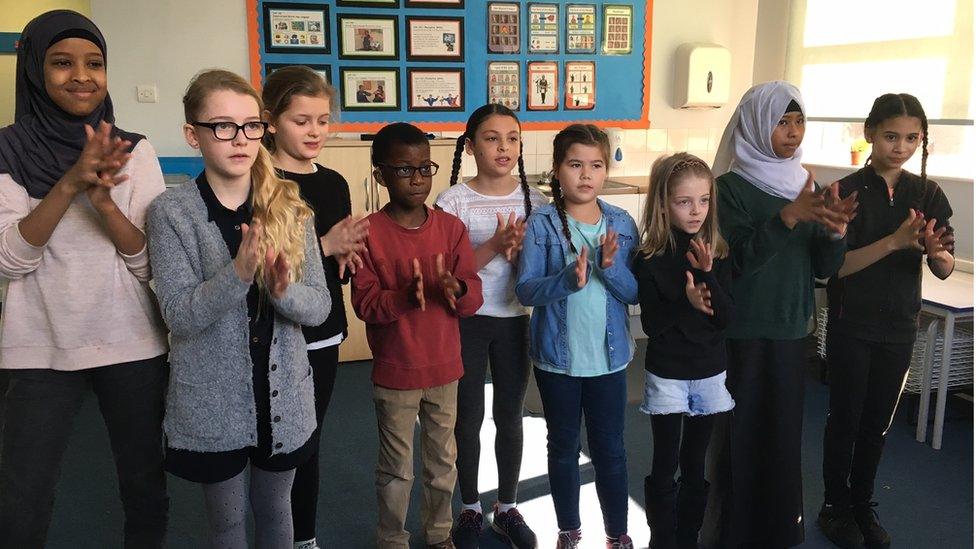
Pupils at Blanche Nevile and Highgate Primary School learn BSL together
While learning BSL may be a great idea in principle, it may not be practical for the vast majority of schools.
Russell Hobby, general secretary of school leaders' union NAHT, says: "While we strongly believe that schools should be inclusive places to learn, it would not be possible to add BSL as a mandatory part of the national curriculum given the many other demands on schools' curriculum time.
"Something else would need to be cut."
But he adds: "Now, support for schools to provide it as an extra-curriculum option would be a promising idea."

A mother's experience of deafness
"It had never occurred to me that my child could be deaf, and what I went through following that discovery I can only describe as a form of grief."
For Katherine Mount, finding out her new baby was deaf meant many of the hopes she had had for him were taken away.
"I couldn't even sing to him at bedtime," she says.
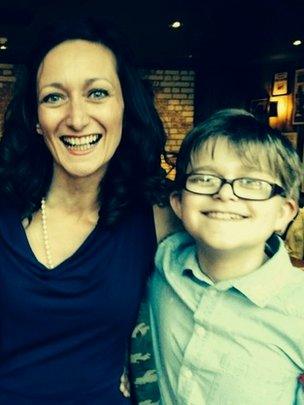
While she learnt BSL to communicate with her son, she found the absence of signing ability within the community made it difficult for both of them.
"I became Ethan's window to the world, his interpreter, when all I really wanted was to parent him," Ms Mount says.
" And can you imagine how frustrating that is for a young kid?
"Every time he ever wanted to speak to any hearing child or they were trying to talk to him he had to look to his mother to translate."
Ms Mount has signed Mr Barrow's petition, saying: "This would give real access to friendships and everyday stuff for kids like Ethan.
"I can't tell you how much he has missed out on through other people's unfamiliarity with sign language."

The petition currently has more than 23,000 signatures. A petition needs to have 100,000 to be considered for debate in Parliament.
Should BSL be compulsory in schools? Join the conversation - find us on Facebook, external
Video Journalist: Hannah Gelbart
Related topics
- Published15 March 2017
